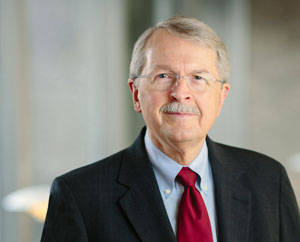World-renowned expert on breast cancer, Dr. James Ingle, attended the 37th San Antonio Breast Cancer Symposium yesterday, December 10, to receive the 2014 William L. McGuire Memorial Lecture Award and gave a memorial lecture titled, “Pharmacogenomics in the Quest for Precision Endocrine Therapy of Breast Cancer”.
Dr. Ingle was selected by the SABCS Executive and Planning Committees among persons nominated by prominent researchers in the field.
Dr. James IngleHe is widely known for his clinically impactful research on two chief endocrine breast cancer treatments: tamoxifen and aromatase inhibitors. Just recently, Dr. Ingle took on a leadership role in the Mayo Clinic Pharmacogenomic Research Network to oversee multiple genome-wide association studies to investigate genetic variability in patients’ response to these two endocrine treatments, as well as chemotherapy – a project essential to advance precision medicine that focuses on individualized treatments.
Dr. Ingle is also involved in the identification of genetic biomarkers that can predict which breast cancer patients are more likely to benefit from selective estrogen receptor modulator (SERM) treatments, such as tamoxifen and raloxifene, for breast cancer prevention.
He and his team of researchers studied the worldwide registry of patients who have received SERM therapy, and successfully identified a pair of biomarkers linked to breast cancer prevention in women deemed high risk. This information may prove beneficial, not only for understanding SERM therapy, but in other targeted drug studies as well.
[adrotate group=”3″]
Dr. Ingle is currently a professor of oncology at the Foust Professor in the Mayo Clinic College of Medicine in Rochester, Minnesota, and co-leads the Mayo Clinic Cancer Center’s women’s cancer program. He is the co-director of the Mayo Clinic Breast Cancer Specialized Program of Research Excellence (SPORE), whose grants are backed by the National Cancer Institute (NCI). He has also served on the National Institutes of Health, the NCI Breast Cancer Steering Committee and the St. Gallen Consensus Conferences.
In other breast cancer news, a new study titled, “Pre-operative thrombotic complications of neoadjuvant chemotherapy for breast cancer: Implications for immediate breast reconstruction” suggests thromboembolic events that occur during neoadjuvant chemotherapy, can delay or alter breast reconstruction plans.

